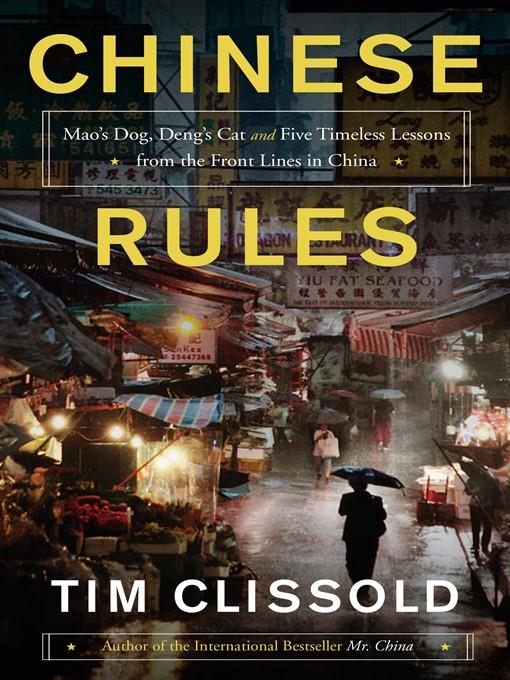
Chinese Rules
Mao's Dog, Deng's Cat, and Five Timeless Lessons from the Front Lines in China
کتاب های مرتبط
- اطلاعات
- نقد و بررسی
- دیدگاه کاربران
نقد و بررسی

September 15, 2014
Drawing on more than 20 years of experience living and working in China, Clissold (Mr. China) a British businessman, offers five lessons that are absolutely crucial to understanding, appreciating, and ultimately working with and competing against the Chinese. These lessons are delivered through two parallel narratives. Clissold looks back to 2005, when he suddenly became involved in an emerging investment market based in China. He cofounded an investment company and invested in the carbon credits market. His recounting of his ensuing struggle to build a successful business aptly conveys the gaps between Western and Chinese business and social practices. These gaps can only be bridged by a working knowledge of the history of Chinese culture, traditions, and society. And so, second, the book is part history: Clissold recounts carefully selected historical episodes, from the dispatch of a British embassy to China in 1792 to the political rise of Mao and his successor Deng Xiaoping, as well as an account of the deadly 1989 protests in Tiananmen Square. Clissold’s memoir is less than captivating—it’s an “adventure” only insofar as investing is an adventure—but the historical portion is well-told. Perhaps most importantly, Clissold’s advice is timely and may even be useful to those outside the business world as well in.

October 1, 2014
A pragmatic application of good-sense peasant wisdom in negotiating big financial deals with the Chinese. An investment analyst who returned to his native England with his family in the mid-2000s after 20 years living in China, only to be lured back by a new high-stakes venture in "carbon credits" ("not the black stuff"), Clissold (Mr. China: A Memoir, 2005) chronicles the whole quirky yet lucrative journey. During his years in China, the author had learned to abandon some basic (Western) assumptions about society, business and government: "I'd learned the hard way that if you wanted to survive in China, it had to be on Chinese terms." As a fluent speaker of Mandarin, Clissold was approached by a fast-talking Australian entrepreneur to help put together a mega-deal that would aid polluting Chinese companies with the installations of new equipment (incinerators available only in Japan) to reduce the country's enormous greenhouse gas emission crisis. The English syndicate of investors researched horribly polluting factories in places like Hangzhou and helped fund the purchase of incinerators, then offered carbon credits on the eager European market. However, the way of doing business in China was not so straightforward or transparent, and the deal threatened to fall through. Hence the need for Clissold's particular brand of patient, frequently amusing translation ("even a beast like a thousand-pound ox must lower its head to drink"). Between dispensing old saws about the futility of changing ancient ways, the author walks readers through the first attempts to crack China's markets, namely by Lord Macartney in 1792, and subsequent resistance to outside change all the way to Mao Zedong. The author's "rules" of respecting China's particular way of doing business include the overarching need for stability and the use of indirection, among others. Clissold's deep knowledge of Chinese culture and language informs this useful work.
COPYRIGHT(2014) Kirkus Reviews, ALL RIGHTS RESERVED.

September 15, 2014
Clissold (Mr. China, 2005) spent more than 20 years in China, watching the pagodas disappear beneath the haze of industrial smog as modernization hit China like a tornado. Yet after returning home to London with his family, with his knowledge of the culture and language, he is somewhat reluctantly pulled back to China to help broker a deal involving carbon credits (and then goes into the business himself). More than many, Clissold understands China, and here, in addition to his narrative (often humorous) of business dealings, he limns the history, battles, lessons, and outlook of this civilization (not, as he points out, merely another nation-state). Westerners, from early conquerors to contemporary businesspeople, who apply their brands of reason and wile to the Chinese often experience confusion and exasperation, and Clissold provides five rules from history to help clarify. Like Eden Collinsworth's I Stand Corrected (2014), Clissold's fascinating slice of life in contemporary China opens a brilliant window into a culture that has evolved over thousands of years, one the rest of the world would do well to try and understand.(Reprinted with permission of Booklist, copyright 2014, American Library Association.)

























دیدگاه کاربران